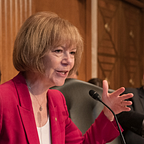My Floor Speech on Supreme Court Nominee Brett Kavanaugh’s Record on Voting Rights
I rise today to talk about my strong opposition to Judge Brett Kavanaugh’s nomination to the Supreme Court. Today I want to specifically focus on what his confirmation could mean for the future of voting rights in this country.
The right to vote is our most sacred right and responsibility as citizens of this great nation. Martin Luther King Jr. called voting, “the foundation stone for political action.”
That’s because when the right to vote is restricted, it undermines the very foundation of our democracy. If certain groups are barred or discouraged from voting, then our elected representatives cannot be held accountable for protecting the rights and interests of all of us.
When you cast your ballot, you decide who should be entrusted to protect all of your rights: your right to make private decisions about how and when to start a family; your right to organize and advocate for fair pay and safe conditions in the workplace; your right to affordable healthcare; and your right to breathe clean air and drink clean water.
But if Judge Kavanaugh is confirmed to the Supreme Court, there is no doubt that he would help his friends in far-right special interest groups continue their coordinated campaign to make it harder for millions of Americans to vote. These are the very same groups who recommended his nomination to the President.
These groups have helped Republican-controlled state legislatures pass laws designed to create obstacles at every step of the voting process –making it more difficult to register to vote, to cast your ballot, and to have your vote counted equally.
And these groups know that they can count on Judge Kavanaugh to uphold these discriminatory laws.
As a judge on the D.C. Circuit Court of Appeals, Judge Kavanaugh has a record of supporting laws that perpetuate voting discrimination, particularly against communities of color.
In 2012, he wrote an opinion for a three-judge panel, upholding South Carolina’s stringent voter ID law, even though the Department of Justice had determined that the law would violate the Voting Rights Act of 1965.
Unfortunately, discriminatory voting laws, like the one Judge Kavanaugh upheld, have a long and shameful history in this country. When this country was founded, generally only property-owning white men had the right to vote. It took eighty years to expand the franchise to all male citizens, regardless of their race or color. It took another fifty years to grant women the right to vote, and another four years to grant that right to all Native Americans.
But the expansion of the legal right to vote did not always translate into access to the polls. It took us over a century to pass the Voting Rights Act of 1965, which outlawed discriminatory poll taxes, literacy tests, and other voter intimidation tactics.
This landmark civil rights legislation finally put real teeth in the promise of the Fifteenth Amendment: that no one should be denied the right to vote on account of their race or the color of their skin.
Unfortunately, the Supreme Court gutted one of the most important protections in the Voting Rights Act in 2013, in Shelby County v. Holder.
Since then, far-right special interests have doubled down on their efforts to make it harder for people to vote, by eliminating same day and online voter registration, limiting early voting, enacting voter ID laws, and purging infrequent voters from the registration rolls.
These modern efforts to make it harder, rather than easier, for people to vote show that there is still so much more work to be done to fulfill the promise of the Fourteenth and Fifteenth Amendments, that every citizen can vote.
We deserve a Justice committed to making our democracy more representative, so that we remain a government for the people, and not just some of the people. We need a Supreme Court Justice who appreciates the history of this hard-won, fundamental right, and who will not reverse course on centuries of progress.
But Judge Kavanaugh’s opinions show that he will allow states to pass laws that make it harder for communities of color and low-income people to make their voices heard.
Our voting laws reflect our beliefs about who should have a voice in this country. I am proud to represent the state with the highest voter turnout in the nation, and I believe that our next Supreme Court Justice should vigorously defend the right of every eligible citizen to exercise their most fundamental constitutional right: the right to vote.
Unfortunately, Judge Kavanaugh’s record demonstrates that he will not be that Justice.
I urge my colleagues to join me in opposing his nomination and I urge the American people to make their voices heard.
Thank you.
